Legal and Ethical Frameworks in Health and Social Care Practice
VerifiedAdded on 2023/06/04
|8
|2289
|275
Essay
AI Summary
This essay provides a comprehensive overview of the legal and ethical frameworks within the health and social care sector. It begins by defining the different levels of law and policy, including case laws, civil laws, and criminal laws, and their roles in safeguarding public well-being. The report then delves into the relationship between ethics and legislation, highlighting the importance of ethical practices like maintaining patient confidentiality and obtaining informed consent. Furthermore, it examines key legislation and national policies, such as the Health and Safety at Work Act 1974, the Mental Health Act 1983, and the Equality Act 2010, and their relevance to health and social care practice. The essay also compares national and organizational policies against national professional standards, analyzing their impact on the delivery of care. The essay references important acts and policies that govern the health and social care environment, emphasizing the importance of balancing legal requirements with ethical considerations to ensure high-quality care and patient safety.

Essay
Paraphrase This Document
Need a fresh take? Get an instant paraphrase of this document with our AI Paraphraser
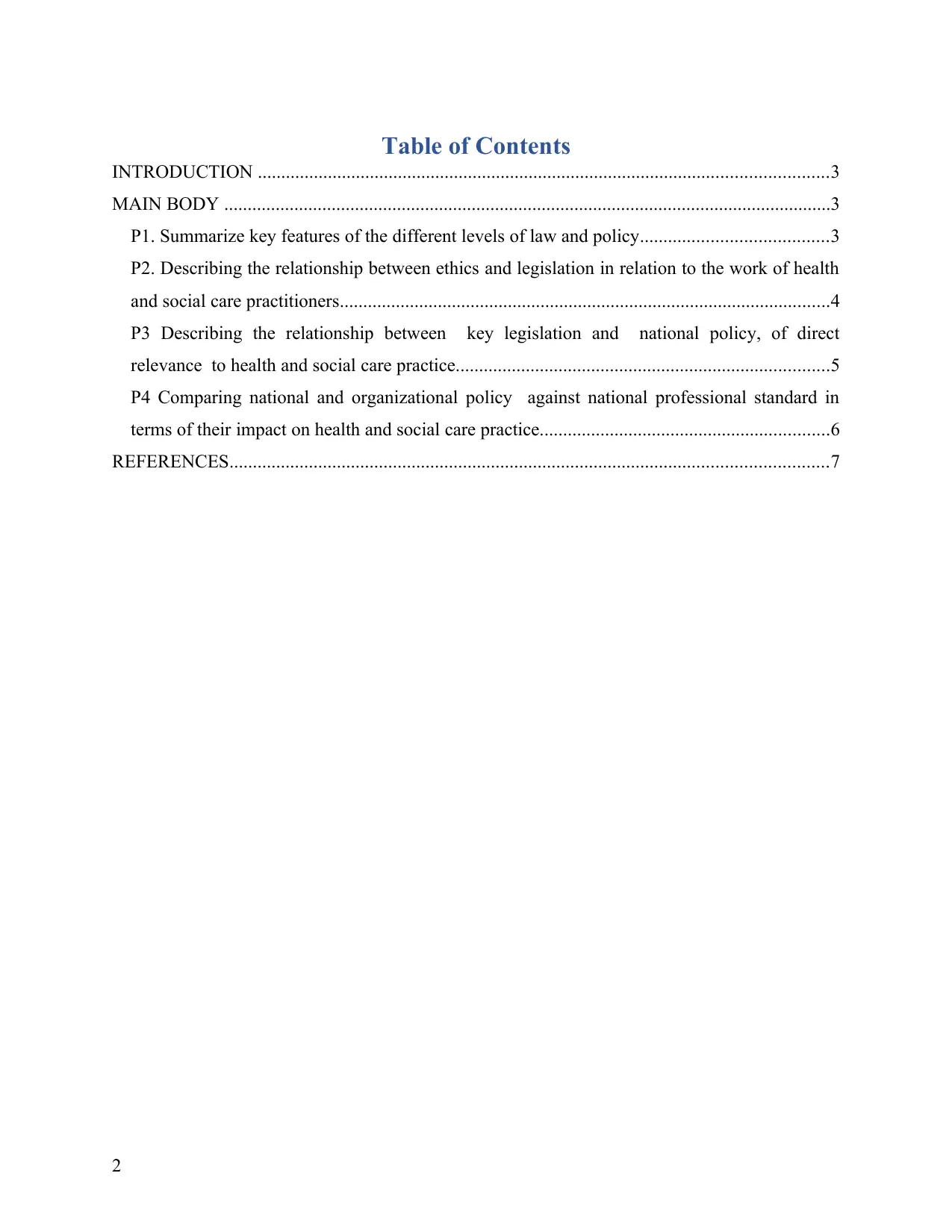
Table of Contents
INTRODUCTION ..........................................................................................................................3
MAIN BODY ..................................................................................................................................3
P1. Summarize key features of the different levels of law and policy........................................3
P2. Describing the relationship between ethics and legislation in relation to the work of health
and social care practitioners.........................................................................................................4
P3 Describing the relationship between key legislation and national policy, of direct
relevance to health and social care practice................................................................................5
P4 Comparing national and organizational policy against national professional standard in
terms of their impact on health and social care practice..............................................................6
REFERENCES................................................................................................................................7
2
INTRODUCTION ..........................................................................................................................3
MAIN BODY ..................................................................................................................................3
P1. Summarize key features of the different levels of law and policy........................................3
P2. Describing the relationship between ethics and legislation in relation to the work of health
and social care practitioners.........................................................................................................4
P3 Describing the relationship between key legislation and national policy, of direct
relevance to health and social care practice................................................................................5
P4 Comparing national and organizational policy against national professional standard in
terms of their impact on health and social care practice..............................................................6
REFERENCES................................................................................................................................7
2
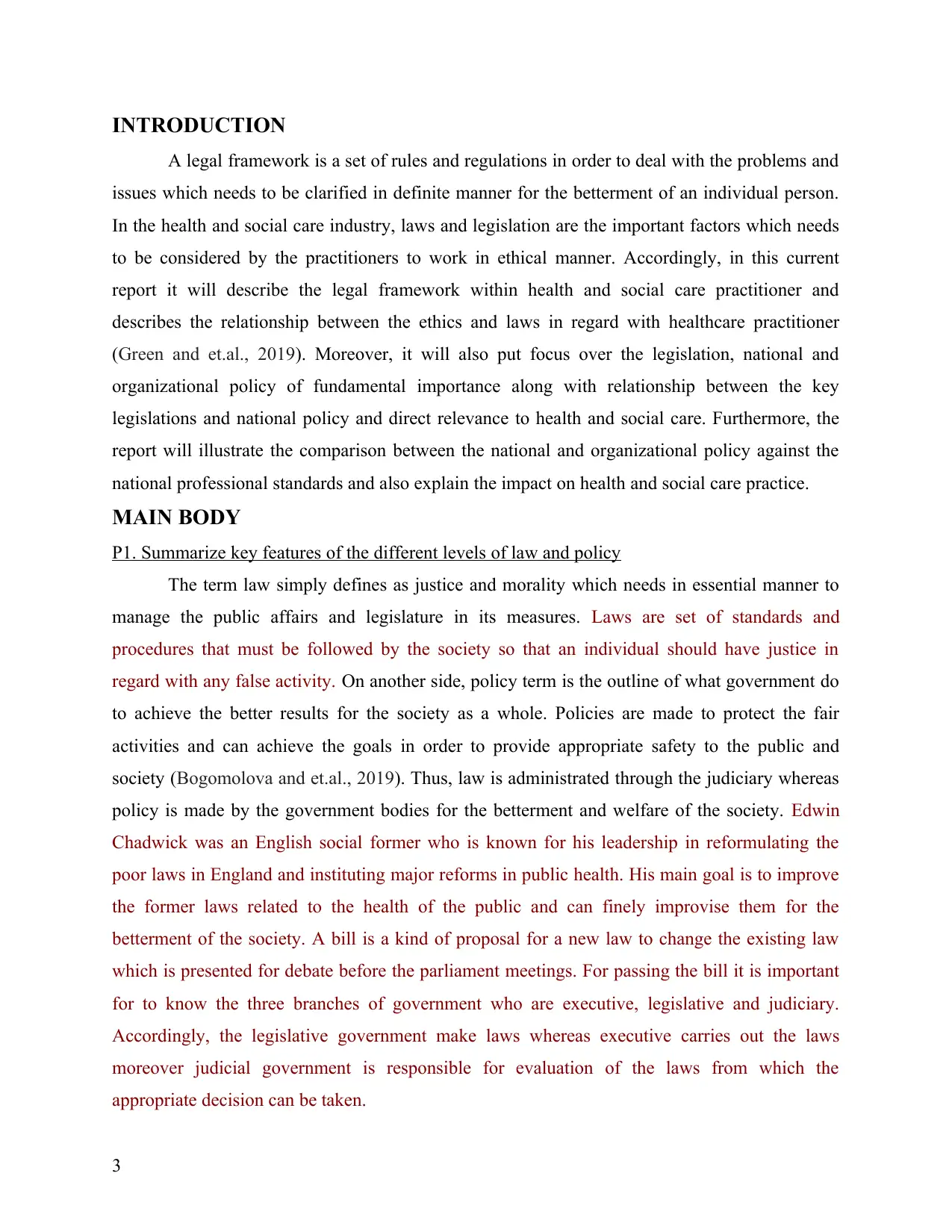
INTRODUCTION
A legal framework is a set of rules and regulations in order to deal with the problems and
issues which needs to be clarified in definite manner for the betterment of an individual person.
In the health and social care industry, laws and legislation are the important factors which needs
to be considered by the practitioners to work in ethical manner. Accordingly, in this current
report it will describe the legal framework within health and social care practitioner and
describes the relationship between the ethics and laws in regard with healthcare practitioner
(Green and et.al., 2019). Moreover, it will also put focus over the legislation, national and
organizational policy of fundamental importance along with relationship between the key
legislations and national policy and direct relevance to health and social care. Furthermore, the
report will illustrate the comparison between the national and organizational policy against the
national professional standards and also explain the impact on health and social care practice.
MAIN BODY
P1. Summarize key features of the different levels of law and policy
The term law simply defines as justice and morality which needs in essential manner to
manage the public affairs and legislature in its measures. Laws are set of standards and
procedures that must be followed by the society so that an individual should have justice in
regard with any false activity. On another side, policy term is the outline of what government do
to achieve the better results for the society as a whole. Policies are made to protect the fair
activities and can achieve the goals in order to provide appropriate safety to the public and
society (Bogomolova and et.al., 2019). Thus, law is administrated through the judiciary whereas
policy is made by the government bodies for the betterment and welfare of the society. Edwin
Chadwick was an English social former who is known for his leadership in reformulating the
poor laws in England and instituting major reforms in public health. His main goal is to improve
the former laws related to the health of the public and can finely improvise them for the
betterment of the society. A bill is a kind of proposal for a new law to change the existing law
which is presented for debate before the parliament meetings. For passing the bill it is important
for to know the three branches of government who are executive, legislative and judiciary.
Accordingly, the legislative government make laws whereas executive carries out the laws
moreover judicial government is responsible for evaluation of the laws from which the
appropriate decision can be taken.
3
A legal framework is a set of rules and regulations in order to deal with the problems and
issues which needs to be clarified in definite manner for the betterment of an individual person.
In the health and social care industry, laws and legislation are the important factors which needs
to be considered by the practitioners to work in ethical manner. Accordingly, in this current
report it will describe the legal framework within health and social care practitioner and
describes the relationship between the ethics and laws in regard with healthcare practitioner
(Green and et.al., 2019). Moreover, it will also put focus over the legislation, national and
organizational policy of fundamental importance along with relationship between the key
legislations and national policy and direct relevance to health and social care. Furthermore, the
report will illustrate the comparison between the national and organizational policy against the
national professional standards and also explain the impact on health and social care practice.
MAIN BODY
P1. Summarize key features of the different levels of law and policy
The term law simply defines as justice and morality which needs in essential manner to
manage the public affairs and legislature in its measures. Laws are set of standards and
procedures that must be followed by the society so that an individual should have justice in
regard with any false activity. On another side, policy term is the outline of what government do
to achieve the better results for the society as a whole. Policies are made to protect the fair
activities and can achieve the goals in order to provide appropriate safety to the public and
society (Bogomolova and et.al., 2019). Thus, law is administrated through the judiciary whereas
policy is made by the government bodies for the betterment and welfare of the society. Edwin
Chadwick was an English social former who is known for his leadership in reformulating the
poor laws in England and instituting major reforms in public health. His main goal is to improve
the former laws related to the health of the public and can finely improvise them for the
betterment of the society. A bill is a kind of proposal for a new law to change the existing law
which is presented for debate before the parliament meetings. For passing the bill it is important
for to know the three branches of government who are executive, legislative and judiciary.
Accordingly, the legislative government make laws whereas executive carries out the laws
moreover judicial government is responsible for evaluation of the laws from which the
appropriate decision can be taken.
3
⊘ This is a preview!⊘
Do you want full access?
Subscribe today to unlock all pages.

Trusted by 1+ million students worldwide
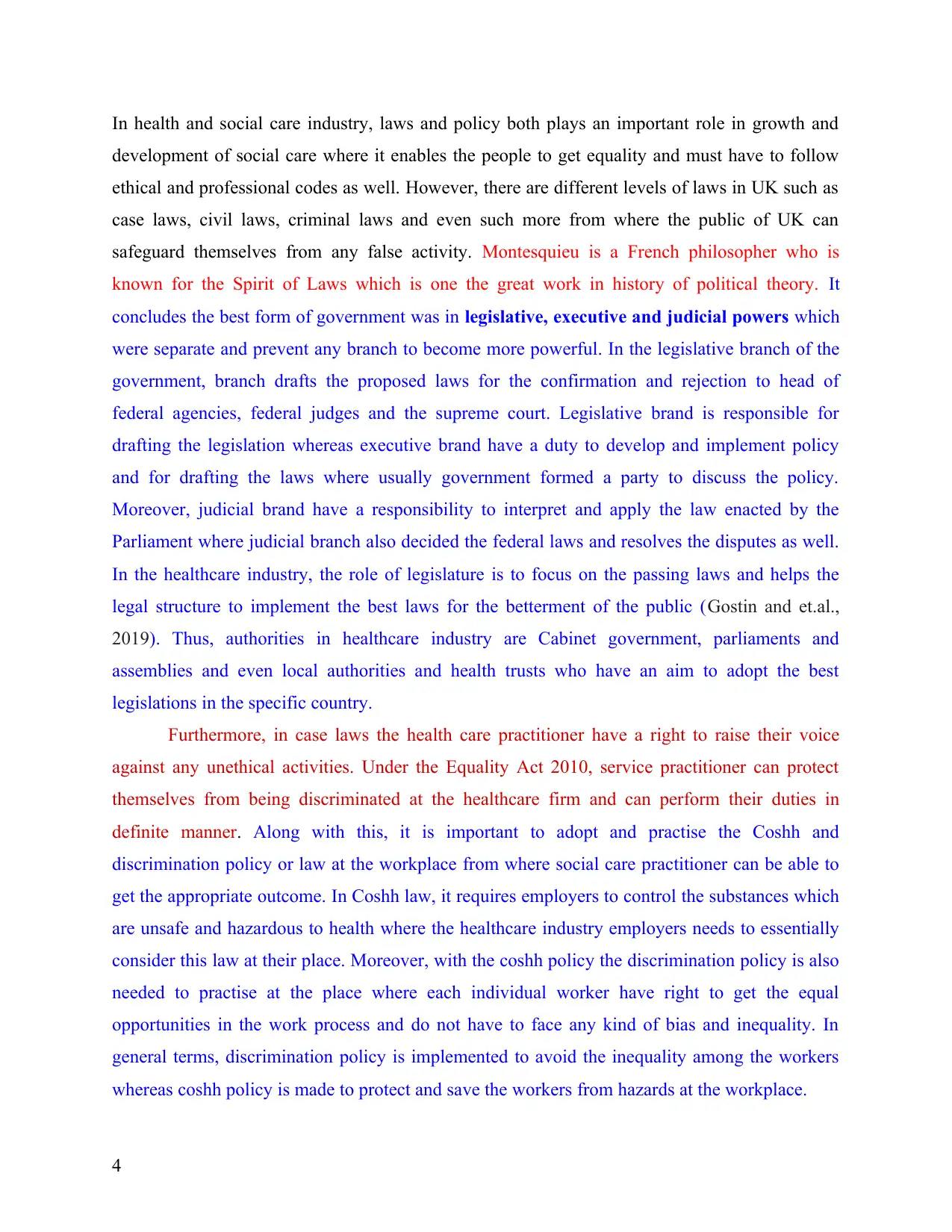
In health and social care industry, laws and policy both plays an important role in growth and
development of social care where it enables the people to get equality and must have to follow
ethical and professional codes as well. However, there are different levels of laws in UK such as
case laws, civil laws, criminal laws and even such more from where the public of UK can
safeguard themselves from any false activity. Montesquieu is a French philosopher who is
known for the Spirit of Laws which is one the great work in history of political theory. It
concludes the best form of government was in legislative, executive and judicial powers which
were separate and prevent any branch to become more powerful. In the legislative branch of the
government, branch drafts the proposed laws for the confirmation and rejection to head of
federal agencies, federal judges and the supreme court. Legislative brand is responsible for
drafting the legislation whereas executive brand have a duty to develop and implement policy
and for drafting the laws where usually government formed a party to discuss the policy.
Moreover, judicial brand have a responsibility to interpret and apply the law enacted by the
Parliament where judicial branch also decided the federal laws and resolves the disputes as well.
In the healthcare industry, the role of legislature is to focus on the passing laws and helps the
legal structure to implement the best laws for the betterment of the public (Gostin and et.al.,
2019). Thus, authorities in healthcare industry are Cabinet government, parliaments and
assemblies and even local authorities and health trusts who have an aim to adopt the best
legislations in the specific country.
Furthermore, in case laws the health care practitioner have a right to raise their voice
against any unethical activities. Under the Equality Act 2010, service practitioner can protect
themselves from being discriminated at the healthcare firm and can perform their duties in
definite manner. Along with this, it is important to adopt and practise the Coshh and
discrimination policy or law at the workplace from where social care practitioner can be able to
get the appropriate outcome. In Coshh law, it requires employers to control the substances which
are unsafe and hazardous to health where the healthcare industry employers needs to essentially
consider this law at their place. Moreover, with the coshh policy the discrimination policy is also
needed to practise at the place where each individual worker have right to get the equal
opportunities in the work process and do not have to face any kind of bias and inequality. In
general terms, discrimination policy is implemented to avoid the inequality among the workers
whereas coshh policy is made to protect and save the workers from hazards at the workplace.
4
development of social care where it enables the people to get equality and must have to follow
ethical and professional codes as well. However, there are different levels of laws in UK such as
case laws, civil laws, criminal laws and even such more from where the public of UK can
safeguard themselves from any false activity. Montesquieu is a French philosopher who is
known for the Spirit of Laws which is one the great work in history of political theory. It
concludes the best form of government was in legislative, executive and judicial powers which
were separate and prevent any branch to become more powerful. In the legislative branch of the
government, branch drafts the proposed laws for the confirmation and rejection to head of
federal agencies, federal judges and the supreme court. Legislative brand is responsible for
drafting the legislation whereas executive brand have a duty to develop and implement policy
and for drafting the laws where usually government formed a party to discuss the policy.
Moreover, judicial brand have a responsibility to interpret and apply the law enacted by the
Parliament where judicial branch also decided the federal laws and resolves the disputes as well.
In the healthcare industry, the role of legislature is to focus on the passing laws and helps the
legal structure to implement the best laws for the betterment of the public (Gostin and et.al.,
2019). Thus, authorities in healthcare industry are Cabinet government, parliaments and
assemblies and even local authorities and health trusts who have an aim to adopt the best
legislations in the specific country.
Furthermore, in case laws the health care practitioner have a right to raise their voice
against any unethical activities. Under the Equality Act 2010, service practitioner can protect
themselves from being discriminated at the healthcare firm and can perform their duties in
definite manner. Along with this, it is important to adopt and practise the Coshh and
discrimination policy or law at the workplace from where social care practitioner can be able to
get the appropriate outcome. In Coshh law, it requires employers to control the substances which
are unsafe and hazardous to health where the healthcare industry employers needs to essentially
consider this law at their place. Moreover, with the coshh policy the discrimination policy is also
needed to practise at the place where each individual worker have right to get the equal
opportunities in the work process and do not have to face any kind of bias and inequality. In
general terms, discrimination policy is implemented to avoid the inequality among the workers
whereas coshh policy is made to protect and save the workers from hazards at the workplace.
4
Paraphrase This Document
Need a fresh take? Get an instant paraphrase of this document with our AI Paraphraser
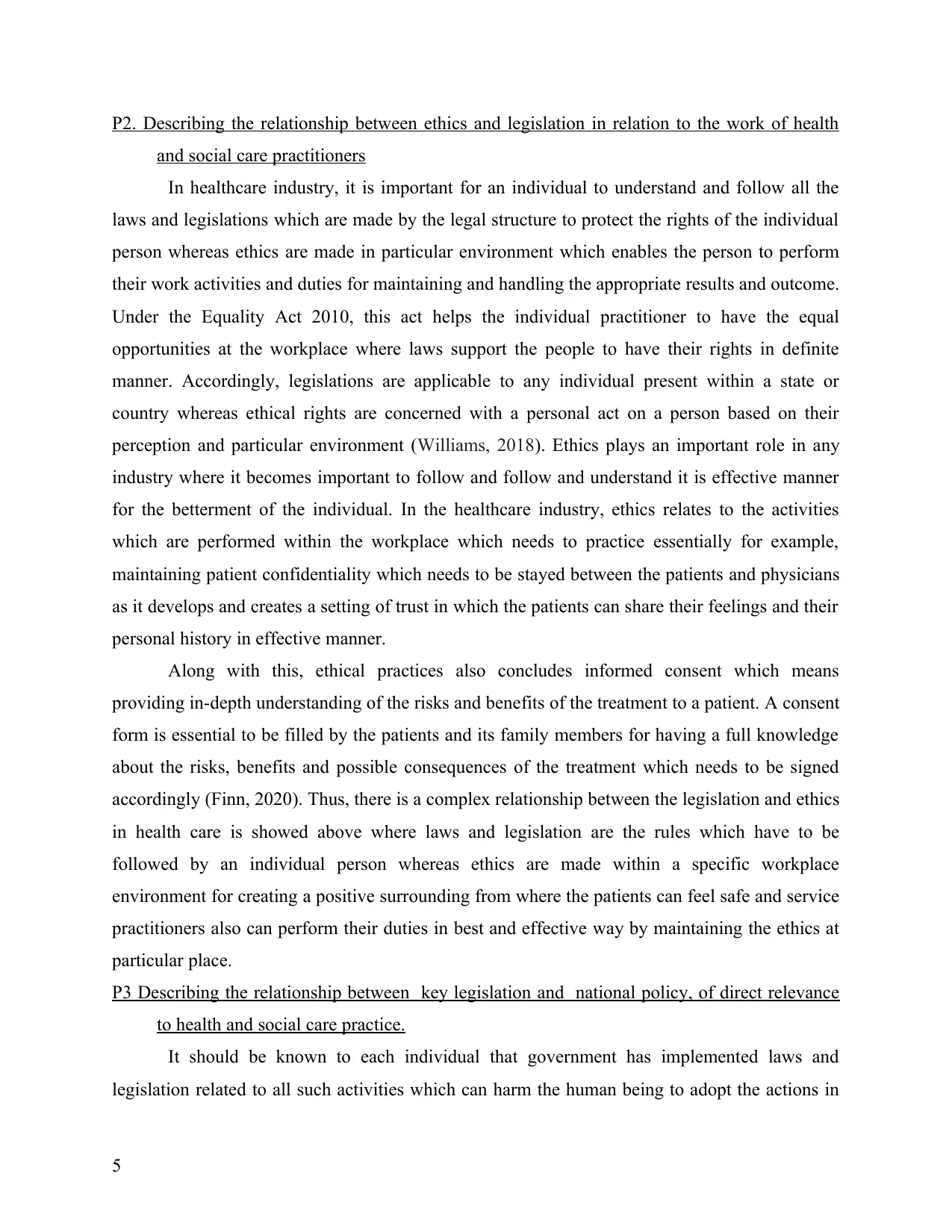
P2. Describing the relationship between ethics and legislation in relation to the work of health
and social care practitioners
In healthcare industry, it is important for an individual to understand and follow all the
laws and legislations which are made by the legal structure to protect the rights of the individual
person whereas ethics are made in particular environment which enables the person to perform
their work activities and duties for maintaining and handling the appropriate results and outcome.
Under the Equality Act 2010, this act helps the individual practitioner to have the equal
opportunities at the workplace where laws support the people to have their rights in definite
manner. Accordingly, legislations are applicable to any individual present within a state or
country whereas ethical rights are concerned with a personal act on a person based on their
perception and particular environment (Williams, 2018). Ethics plays an important role in any
industry where it becomes important to follow and follow and understand it is effective manner
for the betterment of the individual. In the healthcare industry, ethics relates to the activities
which are performed within the workplace which needs to practice essentially for example,
maintaining patient confidentiality which needs to be stayed between the patients and physicians
as it develops and creates a setting of trust in which the patients can share their feelings and their
personal history in effective manner.
Along with this, ethical practices also concludes informed consent which means
providing in-depth understanding of the risks and benefits of the treatment to a patient. A consent
form is essential to be filled by the patients and its family members for having a full knowledge
about the risks, benefits and possible consequences of the treatment which needs to be signed
accordingly (Finn, 2020). Thus, there is a complex relationship between the legislation and ethics
in health care is showed above where laws and legislation are the rules which have to be
followed by an individual person whereas ethics are made within a specific workplace
environment for creating a positive surrounding from where the patients can feel safe and service
practitioners also can perform their duties in best and effective way by maintaining the ethics at
particular place.
P3 Describing the relationship between key legislation and national policy, of direct relevance
to health and social care practice.
It should be known to each individual that government has implemented laws and
legislation related to all such activities which can harm the human being to adopt the actions in
5
and social care practitioners
In healthcare industry, it is important for an individual to understand and follow all the
laws and legislations which are made by the legal structure to protect the rights of the individual
person whereas ethics are made in particular environment which enables the person to perform
their work activities and duties for maintaining and handling the appropriate results and outcome.
Under the Equality Act 2010, this act helps the individual practitioner to have the equal
opportunities at the workplace where laws support the people to have their rights in definite
manner. Accordingly, legislations are applicable to any individual present within a state or
country whereas ethical rights are concerned with a personal act on a person based on their
perception and particular environment (Williams, 2018). Ethics plays an important role in any
industry where it becomes important to follow and follow and understand it is effective manner
for the betterment of the individual. In the healthcare industry, ethics relates to the activities
which are performed within the workplace which needs to practice essentially for example,
maintaining patient confidentiality which needs to be stayed between the patients and physicians
as it develops and creates a setting of trust in which the patients can share their feelings and their
personal history in effective manner.
Along with this, ethical practices also concludes informed consent which means
providing in-depth understanding of the risks and benefits of the treatment to a patient. A consent
form is essential to be filled by the patients and its family members for having a full knowledge
about the risks, benefits and possible consequences of the treatment which needs to be signed
accordingly (Finn, 2020). Thus, there is a complex relationship between the legislation and ethics
in health care is showed above where laws and legislation are the rules which have to be
followed by an individual person whereas ethics are made within a specific workplace
environment for creating a positive surrounding from where the patients can feel safe and service
practitioners also can perform their duties in best and effective way by maintaining the ethics at
particular place.
P3 Describing the relationship between key legislation and national policy, of direct relevance
to health and social care practice.
It should be known to each individual that government has implemented laws and
legislation related to all such activities which can harm the human being to adopt the actions in
5
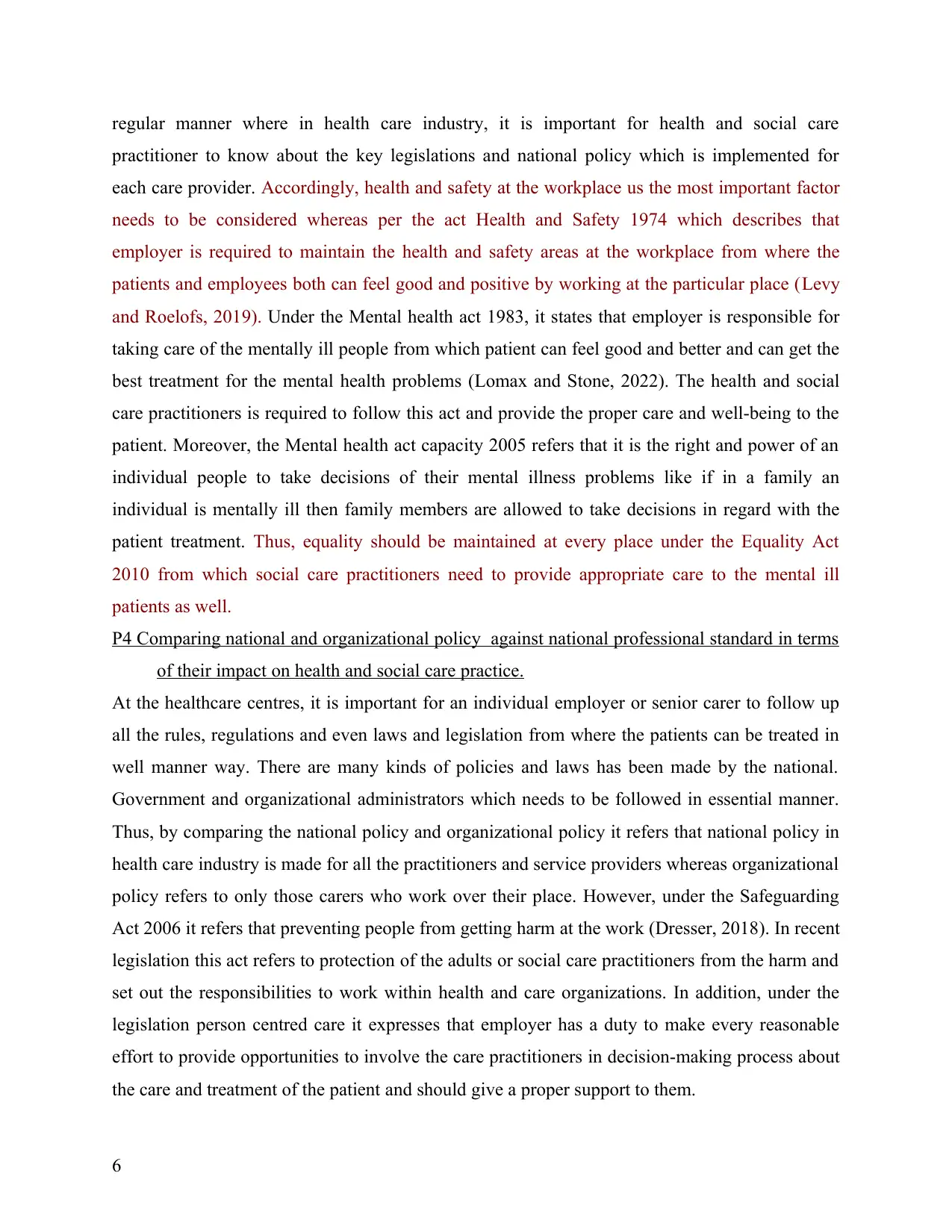
regular manner where in health care industry, it is important for health and social care
practitioner to know about the key legislations and national policy which is implemented for
each care provider. Accordingly, health and safety at the workplace us the most important factor
needs to be considered whereas per the act Health and Safety 1974 which describes that
employer is required to maintain the health and safety areas at the workplace from where the
patients and employees both can feel good and positive by working at the particular place (Levy
and Roelofs, 2019). Under the Mental health act 1983, it states that employer is responsible for
taking care of the mentally ill people from which patient can feel good and better and can get the
best treatment for the mental health problems (Lomax and Stone, 2022). The health and social
care practitioners is required to follow this act and provide the proper care and well-being to the
patient. Moreover, the Mental health act capacity 2005 refers that it is the right and power of an
individual people to take decisions of their mental illness problems like if in a family an
individual is mentally ill then family members are allowed to take decisions in regard with the
patient treatment. Thus, equality should be maintained at every place under the Equality Act
2010 from which social care practitioners need to provide appropriate care to the mental ill
patients as well.
P4 Comparing national and organizational policy against national professional standard in terms
of their impact on health and social care practice.
At the healthcare centres, it is important for an individual employer or senior carer to follow up
all the rules, regulations and even laws and legislation from where the patients can be treated in
well manner way. There are many kinds of policies and laws has been made by the national.
Government and organizational administrators which needs to be followed in essential manner.
Thus, by comparing the national policy and organizational policy it refers that national policy in
health care industry is made for all the practitioners and service providers whereas organizational
policy refers to only those carers who work over their place. However, under the Safeguarding
Act 2006 it refers that preventing people from getting harm at the work (Dresser, 2018). In recent
legislation this act refers to protection of the adults or social care practitioners from the harm and
set out the responsibilities to work within health and care organizations. In addition, under the
legislation person centred care it expresses that employer has a duty to make every reasonable
effort to provide opportunities to involve the care practitioners in decision-making process about
the care and treatment of the patient and should give a proper support to them.
6
practitioner to know about the key legislations and national policy which is implemented for
each care provider. Accordingly, health and safety at the workplace us the most important factor
needs to be considered whereas per the act Health and Safety 1974 which describes that
employer is required to maintain the health and safety areas at the workplace from where the
patients and employees both can feel good and positive by working at the particular place (Levy
and Roelofs, 2019). Under the Mental health act 1983, it states that employer is responsible for
taking care of the mentally ill people from which patient can feel good and better and can get the
best treatment for the mental health problems (Lomax and Stone, 2022). The health and social
care practitioners is required to follow this act and provide the proper care and well-being to the
patient. Moreover, the Mental health act capacity 2005 refers that it is the right and power of an
individual people to take decisions of their mental illness problems like if in a family an
individual is mentally ill then family members are allowed to take decisions in regard with the
patient treatment. Thus, equality should be maintained at every place under the Equality Act
2010 from which social care practitioners need to provide appropriate care to the mental ill
patients as well.
P4 Comparing national and organizational policy against national professional standard in terms
of their impact on health and social care practice.
At the healthcare centres, it is important for an individual employer or senior carer to follow up
all the rules, regulations and even laws and legislation from where the patients can be treated in
well manner way. There are many kinds of policies and laws has been made by the national.
Government and organizational administrators which needs to be followed in essential manner.
Thus, by comparing the national policy and organizational policy it refers that national policy in
health care industry is made for all the practitioners and service providers whereas organizational
policy refers to only those carers who work over their place. However, under the Safeguarding
Act 2006 it refers that preventing people from getting harm at the work (Dresser, 2018). In recent
legislation this act refers to protection of the adults or social care practitioners from the harm and
set out the responsibilities to work within health and care organizations. In addition, under the
legislation person centred care it expresses that employer has a duty to make every reasonable
effort to provide opportunities to involve the care practitioners in decision-making process about
the care and treatment of the patient and should give a proper support to them.
6
⊘ This is a preview!⊘
Do you want full access?
Subscribe today to unlock all pages.

Trusted by 1+ million students worldwide
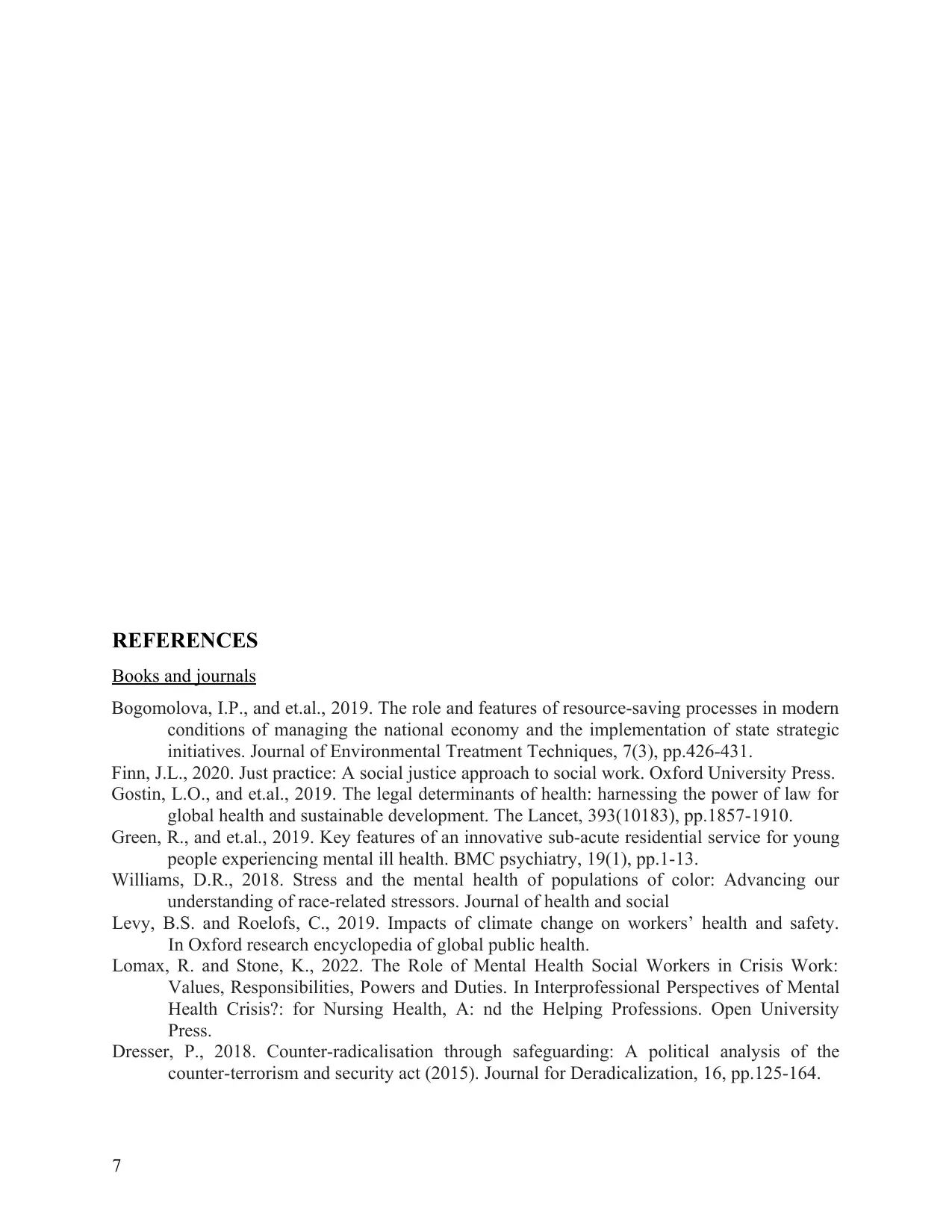
REFERENCES
Books and journals
Bogomolova, I.P., and et.al., 2019. The role and features of resource-saving processes in modern
conditions of managing the national economy and the implementation of state strategic
initiatives. Journal of Environmental Treatment Techniques, 7(3), pp.426-431.
Finn, J.L., 2020. Just practice: A social justice approach to social work. Oxford University Press.
Gostin, L.O., and et.al., 2019. The legal determinants of health: harnessing the power of law for
global health and sustainable development. The Lancet, 393(10183), pp.1857-1910.
Green, R., and et.al., 2019. Key features of an innovative sub-acute residential service for young
people experiencing mental ill health. BMC psychiatry, 19(1), pp.1-13.
Williams, D.R., 2018. Stress and the mental health of populations of color: Advancing our
understanding of race-related stressors. Journal of health and social
Levy, B.S. and Roelofs, C., 2019. Impacts of climate change on workers’ health and safety.
In Oxford research encyclopedia of global public health.
Lomax, R. and Stone, K., 2022. The Role of Mental Health Social Workers in Crisis Work:
Values, Responsibilities, Powers and Duties. In Interprofessional Perspectives of Mental
Health Crisis?: for Nursing Health, A: nd the Helping Professions. Open University
Press.
Dresser, P., 2018. Counter-radicalisation through safeguarding: A political analysis of the
counter-terrorism and security act (2015). Journal for Deradicalization, 16, pp.125-164.
7
Books and journals
Bogomolova, I.P., and et.al., 2019. The role and features of resource-saving processes in modern
conditions of managing the national economy and the implementation of state strategic
initiatives. Journal of Environmental Treatment Techniques, 7(3), pp.426-431.
Finn, J.L., 2020. Just practice: A social justice approach to social work. Oxford University Press.
Gostin, L.O., and et.al., 2019. The legal determinants of health: harnessing the power of law for
global health and sustainable development. The Lancet, 393(10183), pp.1857-1910.
Green, R., and et.al., 2019. Key features of an innovative sub-acute residential service for young
people experiencing mental ill health. BMC psychiatry, 19(1), pp.1-13.
Williams, D.R., 2018. Stress and the mental health of populations of color: Advancing our
understanding of race-related stressors. Journal of health and social
Levy, B.S. and Roelofs, C., 2019. Impacts of climate change on workers’ health and safety.
In Oxford research encyclopedia of global public health.
Lomax, R. and Stone, K., 2022. The Role of Mental Health Social Workers in Crisis Work:
Values, Responsibilities, Powers and Duties. In Interprofessional Perspectives of Mental
Health Crisis?: for Nursing Health, A: nd the Helping Professions. Open University
Press.
Dresser, P., 2018. Counter-radicalisation through safeguarding: A political analysis of the
counter-terrorism and security act (2015). Journal for Deradicalization, 16, pp.125-164.
7
Paraphrase This Document
Need a fresh take? Get an instant paraphrase of this document with our AI Paraphraser

behavior, 59(4), pp.466-485.
8
8
1 out of 8
Related Documents
Your All-in-One AI-Powered Toolkit for Academic Success.
+13062052269
info@desklib.com
Available 24*7 on WhatsApp / Email
![[object Object]](/_next/static/media/star-bottom.7253800d.svg)
Unlock your academic potential
Copyright © 2020–2025 A2Z Services. All Rights Reserved. Developed and managed by ZUCOL.




